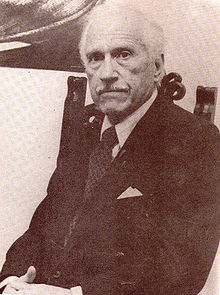Enrique Anderson-Imbert | |
|---|---|
 Imbert in 1980 | |
| Born | February 12, 1910 Córdoba, Argentina |
| Died | December 6, 2000 (aged 90) Buenos Aires, Argentina |
| Occupation | Writer, Critic, Professor |
| Genre | Fantasy, Magical Realism |
| Notable works | El Gato de Cheshire, La Prosa |
Enrique Anderson-Imbert (February 12, 1910– December 6, 2000)[1] was an Argentine novelist, short-story writer and literary critic.
Born in Córdoba, Argentina, the son of Jose Enrique Anderson and Honorina Imbert, Anderson-Imbert graduated from the University of Buenos Aires with a Ph.D. in 1946.[2] From 1940 until 1947 he taught at the University of Tucumán. In 1947, he joined the faculty of the Michigan State University.[3] He was awarded a Guggenheim Fellowship in 1954.[4] He became the first Victor S. Thomas Professor of Hispanic Literature at Harvard University in 1965. Anderson-Imbert remained at Harvard until his retirement in 1980.[3] He was elected a Fellow of the American Academy of Arts and Sciences in 1967.[5]
Anderson-Imbert is best known for his brief "microcuentos" in which he blends fantasy and magical realism. His story "Sala de espera" is taken from The Cheshire Cat, written in 1965; he is also the author of the 1966 short story entitled "Taboo." He also penned the short stories "El Leve Pedro", "El Fantasma", and "Vudu".
With his wife, Margot (née Di Clerico), a librarian, Anderson-Imbert had a son and a daughter. He died on December 6, 2000, in Buenos Aires.
In 2012, the North American Academy of the Spanish Language created the “Enrique Anderson Imbert Prize" to recognize the professional trajectory of those who have contributed with their studies, works, and literary works to the knowledge and dissemination of the Hispanic language and culture in the United States.[6]
- ^ "Enrique Anderson-Imb". Social Security Death Index. New England Historic Genealogical Society. Retrieved 18 April 2011.
- ^ Science Fiction and Fantasy Literature, vol. 2, R. Reginald, 1979, pg 799
- ^ a b "Enrique Anderson-Imbert Faculty of Arts and Science - Memorial Minute". Harvard University Gazette. Retrieved 18 April 2011.
- ^ "Enrique Anderson-Imbert". John SImon Guggenheim Memorial Foundation. Archived from the original on 7 June 2012. Retrieved 18 April 2011.
- ^ "Book of Members, 1780-2010: Chapter A" (PDF). American Academy of Arts and Sciences. Retrieved 18 April 2011.
- ^ https://www.anle.us/premios-anle/premio-nacional-de-la-anle-enrique-anderson-imbert/